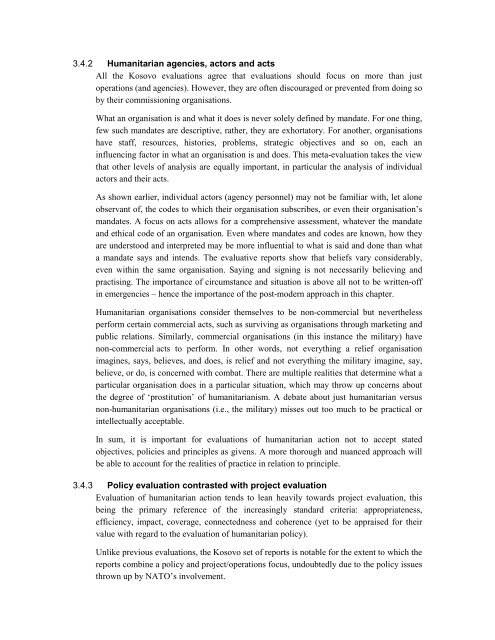Download PDF - ReliefWeb
Download PDF - ReliefWeb
Download PDF - ReliefWeb
You also want an ePaper? Increase the reach of your titles
YUMPU automatically turns print PDFs into web optimized ePapers that Google loves.
3.4.2 Humanitarian agencies, actors and acts<br />
All the Kosovo evaluations agree that evaluations should focus on more than just<br />
operations (and agencies). However, they are often discouraged or prevented from doing so<br />
by their commissioning organisations.<br />
What an organisation is and what it does is never solely defined by mandate. For one thing,<br />
few such mandates are descriptive, rather, they are exhortatory. For another, organisations<br />
have staff, resources, histories, problems, strategic objectives and so on, each an<br />
influencing factor in what an organisation is and does. This meta-evaluation takes the view<br />
that other levels of analysis are equally important, in particular the analysis of individual<br />
actors and their acts.<br />
As shown earlier, individual actors (agency personnel) may not be familiar with, let alone<br />
observant of, the codes to which their organisation subscribes, or even their organisation’s<br />
mandates. A focus on acts allows for a comprehensive assessment, whatever the mandate<br />
and ethical code of an organisation. Even where mandates and codes are known, how they<br />
are understood and interpreted may be more influential to what is said and done than what<br />
a mandate says and intends. The evaluative reports show that beliefs vary considerably,<br />
even within the same organisation. Saying and signing is not necessarily believing and<br />
practising. The importance of circumstance and situation is above all not to be written-off<br />
in emergencies – hence the importance of the post-modern approach in this chapter.<br />
Humanitarian organisations consider themselves to be non-commercial but nevertheless<br />
perform certain commercial acts, such as surviving as organisations through marketing and<br />
public relations. Similarly, commercial organisations (in this instance the military) have<br />
non-commercial acts to perform. In other words, not everything a relief organisation<br />
imagines, says, believes, and does, is relief and not everything the military imagine, say,<br />
believe, or do, is concerned with combat. There are multiple realities that determine what a<br />
particular organisation does in a particular situation, which may throw up concerns about<br />
the degree of ‘prostitution’ of humanitarianism. A debate about just humanitarian versus<br />
non-humanitarian organisations (i.e., the military) misses out too much to be practical or<br />
intellectually acceptable.<br />
In sum, it is important for evaluations of humanitarian action not to accept stated<br />
objectives, policies and principles as givens. A more thorough and nuanced approach will<br />
be able to account for the realities of practice in relation to principle.<br />
3.4.3 Policy evaluation contrasted with project evaluation<br />
Evaluation of humanitarian action tends to lean heavily towards project evaluation, this<br />
being the primary reference of the increasingly standard criteria: appropriateness,<br />
efficiency, impact, coverage, connectedness and coherence (yet to be appraised for their<br />
value with regard to the evaluation of humanitarian policy).<br />
Unlike previous evaluations, the Kosovo set of reports is notable for the extent to which the<br />
reports combine a policy and project/operations focus, undoubtedly due to the policy issues<br />
thrown up by NATO’s involvement.
















![CynefinFramework final [Read-Only]](https://img.yumpu.com/19017304/1/190x135/cynefinframework-final-read-only.jpg?quality=85)